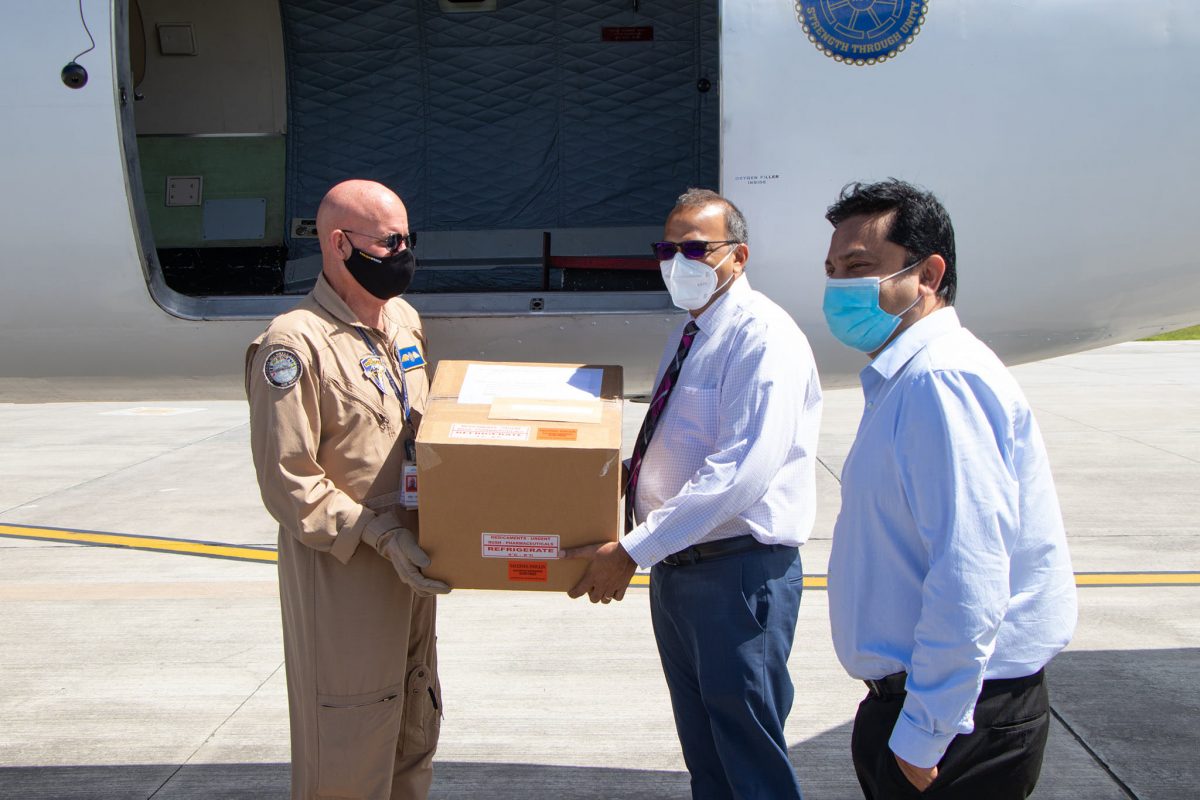A donation of 3,000 doses of the Oxford AstraZeneca vaccines from Barbados has kick-started the first phase of COVID-19 vaccinations in Guyana with frontline workers set to receive their first shots today.
This was disclosed by Minister of Health Dr Frank Anthony who said that the first set of persons to be inoculated with the vaccine are the frontline workers at the Infectious Diseases Hospital at Liliendaal and the George-town Public Hospital (GPHC).
The first vaccination exercise should begin today and marks a major development in Guyana’s battle against the virus which has officially claimed the lives of 182 persons although the death toll is believed to be higher.
Barbados, one of the first Caribbean States to receive COVID-19 vaccines from the Serum Institute of India, yesterday donated 3,000 its 100,000 doses. Barbados’ doses were a donation from India. Bridgetown also donated 100 vaccines for staff of the Georgetown-based CARICOM Secretariat.
President Irfaan Ali announced the donation on the Office of the Presi-dent’s Facebook page.
“I wish to thank Prime Minister, Mia Mottley, and by extension, the people of Barbados for sharing with us from their first batch of vaccines. This act of kindness is among many in recent months that Guyana and Barbados have shared”, the President said. Ali said that in the coming days and weeks Guyana will be in receipt of various tranches of vaccines and assured that the acquisition of the shots is the top priority on the Government’s agenda as it wants every Guyanese to be vaccinated before the end of the year.
Anthony, who received the vaccines at the Eugene F. Correia International Airport at Ogle, also expressed thanks to Prime Minister Mottley for the “generous offer.” He noted that the 3,000 doses will be able to vaccinate 1,500 frontline workers as each person will have to receive two doses of the vaccine. He added that frontline workers will decide whether or not they want be vaccinated.
“If they don’t want it that’s fine but we want to make sure that they have an option to get it,” he said.
When asked whether he will be among the first batch to be vaccinated, Anthony responded that he will not, pointing out that he is not at the frontlines of the pandemic.
The AstraZeneca vaccine was developed by the Anglo-Swedish company in conjunction with the UK’s Oxford University. The Oxford AstraZeneca vaccine can be stored at ordinary refrigerator temperatures.
The Minister noted that the World Health Organi-sation (WHO) has green-lighted the AstraZeneca vaccine and it should be employed for emergency use from today. A few hours before the announcement of the arrival of the first batch of vaccines, the WHO’s Strategic Advisory Group of Experts (SAGE) on immunisation presented interim recommendations on the use of the AstraZeneca vaccine.
SAGE recommended that the vaccine be used in all adults beginning from age 18. However, it said there must be a strong and robust follow-up of the use of the vaccine as is done in every country in which this vaccine is used.
The advisory group also informed that based on current information and evidence on this particular vaccine, it should be administered in two doses of half a milliliter each with an interval of 4 to 12 weeks between the first and second dose. However, the best time to give a second dose to produce a better immune response is for the second dose to be administered between an 8 to12 week interval.
“AstraZeneca has demonstrated safety and efficacy,” SAGE assured before recommending that persons continue to adhere to all COVID-19 preventative measures.
Last year, Guyana joined the COVAX facility and is now eligible to receive vaccines free of cost for 20 per cent of its population. Anthony recently announced that Guyana is expected to receive around 104,000 doses of the AstraZeneca COVID-19 vaccine as the WHO-led mechanism has increased its allocation to the country.
Now that the AstraZeneca vaccine has received the green light from WHO, Guyana is expected to receive its first doses from COVAX later this month.
The Government recently indicated that it working with the Caribbean Community, the Organization of Islamic Cooperation, and the European Union, for a quota of COVID-19 vaccines. President Ali had said that there have also been discussions with the Indian, Russian, and Chinese governments, and while some of these discussions are ongoing, China has already pledged to donate 20,000 doses of vaccines to Guyana.
Additionally, he said that there are also ongoing negotiations with Pfizer, and BioNTech and Moderna Inc to get vaccines from those companies and hopes that a deal can be finalised “shortly”.
Guyana could also receive approximately 149,000 doses of approved COVID-19 vaccines through the CARICOM-African Union arrangement but will have to pay for these.






